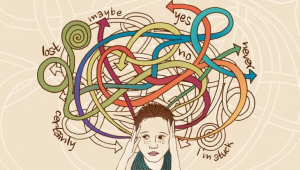Have you ever tried counting stars in the sky? How many did you find? Most of us tried counting stars but got confused and tired. Have you ever counted how many thoughts we have every day? How many thoughts do you believe are useful ? The number of thoughts we have per day varies depending on the person. Some people may have as few as 2,000 thoughts per day, while others may have as many as 80,000. The average person has about 6,000 thoughts per day. Our thoughts can be about anything, from what we’re going to eat for lunch to what we’re going to do next. They can be positive, negative, or neutral. They can be about the past, the present, or the future. These thoughts are actually the outcome of thinking.
Thinking
Thinking is the process of using our minds to make sense of the world around us. It involves using our memories, experiences, and understanding to solve problems, make decisions, and plan for the future. For example, when you are trying to understand a new concept, you are using your thinking skills. You might read about the concept, talk to someone who knows about it. (Or) When you are trying to solve a conflict, you are using your thinking skills. You might try to see things from the other person’s perspective, compromise, or find a solution.
The way we think about things affects how we feel about them, and it in turn affects how we behave. Here is an example of how your thoughts can affect your feelings and behavior before an exam.

Thinking vs Overthinking
Our thoughts, emotions, and behaviors are all interconnected. When one changes, the others are affected. This can create a loop of overthinking. To deal with the consequences of overthinking, it is crucial to understand the distinction between thinking and overthinking.
Imagine if your friend suddenly stopped talking to you, how much time do you think about that incident? one hour, one day or one month? Is it helping you to solve your problem or is it creating more problems for you? When you answer questions about yourself, do you find that you are engaged in the process of thinking?
Thinking helps you in decision making and gives you clarity about the problem. Overthinking, on the other hand, is a pattern of thinking that is excessive, repetitive, and often negative/ irrational. To simply understand the thin line difference between the both, consider the situation. “you are preparing for an upcoming test”. Can you list out your thoughts? Let us see in this situation, what could be your thoughts and when it leads to overthinking.
When you are thinking: you may think about reviewing your notes, making a study guide, and practicing previous questions. You may have a strong sense of assurance in your level of preparation for the test.
When you are overthinking: you may start to worry about how you will perform in the test. You might think about all the things you don’t know in the syllabus and all the ways you could fail repeatedly due to which you may feel anxious and lose focus. You may have trouble letting go of certain thoughts or worries.
If you are someone who relates to the later aspect then let us understand the possible reasons for it.

What made you overthink?
Suppose you are in the class and you suddenly get a random thought. When you keep focusing on the thought, they keep coming and it goes spiraling down. Spiraling down thus affecting your concentration. Did you experience this anytime?
There could be many reasons for overthinking. Few of which are described below.
When you feel a lack of control in certain areas of your lives, overthinking can be a way to regain a sense of control through excessive analysis. Eg- preparing for a major exam. You’ve studied diligently, but there’s still some uncertainty about the questions that might be asked. As the exam approaches, you start feeling a lack of control over the outcome. In an attempt to regain a sense of control, you begin overthinking. Instead of focusing on the material you’ve already studied and trusting your preparation, you start excessively analyzing every possible question that could appear on the exam. You spend hours imagining different scenarios, trying to predict which topics will be emphasized, and second-guessing your understanding of the subject matter.
When you strive for perfection, it can lead to overthinking because you become fixated on making perfect decisions and taking flawless actions. This constant pressure creates a state of worry as you analyze every choice and outcome in great detail. Additionally, when you experience something distressing, overthinking becomes a way for your mind to make sense of it and find comfort. The fear of failure intensifies overthinking as you obsessively dissect every move in an attempt to avoid making mistakes and facing disappointment. Similarly, when you have unresolved issues or conflicts in our lives, you tend to overthink as we search for solutions and try to untangle the complexities. Even during periods of boredom and inactivity, overthinking can take hold as you crave mental stimulation. Ultimately, these factors contribute to overthinking becoming a constant presence in your lives, hindering your ability to be fully present and at peace.
Impact of overthinking
Now that we have understood the possible reasons for why we overthink, let us also look into how it affects us day to day life.
- Feeling anxious
Overthinking can lead to anxiety and inaction. When you repeatedly think about the same thing or worry about your next step, you may feel overwhelmed and tired. This is because overthinking causes you to focus on the negative and the uncertain aspects.
- Quality of sleep
Overthinking can lead to a disrupted sleep schedule. When your mind is preoccupied with thoughts and worries, you may find yourself staying up late, trying to find solutions or answers. This delayed bedtime can result in a reduced quantity of sleep, as you may need to wake up early for school, work, or other commitments. In turn, the lack of sufficient sleep can perpetuate a cycle of overthinking, as sleep deprivation further amplifies stress, anxiety, and mental unrest.
- Relationship gets hampered
When you overthink, you may have trouble communicating effectively with others. You may be hesitant to share your thoughts and feelings, or You may constantly be criticizing yourself and worrying about what others think of you. This can make it difficult to build relationships. You may be more likely to avoid social situations, as you may worry about saying or doing the wrong thing.
- Confusion
Dwelling on a particular thought or problem excessively, often to the point where it becomes unproductive and overwhelming can make you feel confused. Due to which you may feel lost.
Ways to manage overthinking
In a world filled with endless distractions and constant mental chatter, it’s easy to find ourselves trapped in the cycle of overthinking. The more we ruminate on our thoughts, the more they seem to multiply, leaving us feeling overwhelmed and stuck in a state of analysis, exhausted. But what if there was a way to break free from this mental trap and find clarity amidst the chaos?
Let us delve into practical techniques and insights that can help you regain control of your thoughts and channel your mental energy towards productive outcomes.
- Minimization
Imagine you have a presentation today, you were very nervous during the presentation and you did not perform well. You may start thinking “I shouldn’t have done that”, “I am useless”, “I’m never going to be able to do this”,“I don’t have enough knowledge”and “I Am not good enough”. But because of one situation, how can you say that you are not good enough. There are chances that you may be exaggerating the things that are happening around you. Maybe the situation is “X” you might imagine it is ”10X” which may increase your anxiety. When you encounter this situation any time you can just close your eyes and take a deep breath then reflect on whether your thoughts have any evidence. So that you can slow down your thoughts and rationalize.
- Break the chain
When you are aware that you are starting to overthink and your thoughts are repeating, one way to break this cycle of thoughts is to just take a paper and pen and write down all the thoughts that come to your mind or say out the thoughts. Analyze why you are continuously thinking about it by asking the right kind of questions.
- Is the thought true or false?
- If it is true, is thinking about it useful?
- If yes, what can I do about it?
- Controllable factors
There might be few situations about which you may overthink and wish to control it, but you ultimately end up with frustration. Because you realized that no matter what you think or do, it will not change. When dealing with such a situation you can try to write down what is worrying in the present moment in 2 lines and then write down what you can control and what you can’t control about it. Which brings your focus on things you can control rather than pushing yourself on things that are not in your hands.
- Mindfulness
Mindfulness is all about paying attention and being fully present in the moment. It is a kind of awareness to everything you do. Whether it’s studying, playing sports, or even just taking a walk, you engage your senses and give your full attention to the present moment. It helps you notice your thoughts, emotions, and sensations without judgment, allowing you to better understand yourself and the world around you.
Imagine you’re a student studying for an upcoming exam. As you sit down to study, your mind starts to wander, and thoughts like “I’m going to fail this test” or “I’ll never understand this material” begin to flood your mind. These negative thoughts can be overwhelming and lead to anxiety and self-doubt.
To apply the thought labeling technique, start by taking a deep breath and becoming aware of the thoughts that are arising. As you notice these thoughts, mentally label them by saying something like, “There goes a negative thought about failing” or “Here’s a self-doubt thought.”
The act of labeling your thoughts helps you recognize that they are just thoughts and not necessarily reflective of reality. It allows you to step back and observe them without getting carried away or consumed by them. By creating this mental distance, you can prevent overthinking from taking over and affecting your focus and confidence.
As a student, you may encounter various types of overthinking, such as worrying about grades, comparing yourself to others, or feeling overwhelmed by academic pressure. By using thought labeling, you can identify these specific thought patterns and gain a clearer understanding of the types of thoughts that tend to trigger your overthinking.
Conclusion
In the realm of our minds, thoughts come and go like passing clouds in the sky. They can be fleeting, erratic, and sometimes even misleading. By consciously observing our thoughts, we can evaluate their validity and consider alternative perspectives. This process allows us to think more objectively, question our assumptions, and challenge negative or unhelpful thinking patterns. We gain the capacity to approach our academic challenges with clarity and reason, making informed decisions and taking action based on sound judgment rather than impulsive reactions driven by overthinking.
“Similar to how we refine water by preserving essential minerals, we can refine our thoughts by directing our focus on thoughts that nurture our growth and well-being .”
Sruthi Punna
Development Coach

